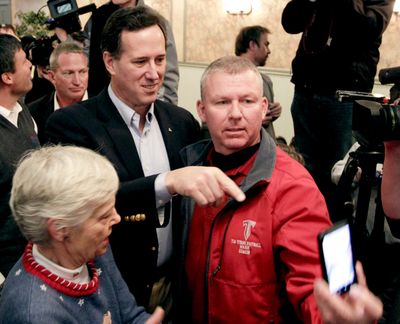Caucuses, primary give momentum to Santorum

WASHINGTON – A resurgent Rick Santorum won Minnesota’s Republican presidential caucuses with ease Tuesday night and edged out Mitt Romney in Colorado, raising fresh questions about the front-runner’s appeal among the ardent conservatives at the core of the party’s political base.
Santorum triumphed, as well, in a nonbinding Missouri primary that was worth bragging rights but no delegates.
“Conservatism is alive and well in Missouri and Minnesota,” the jubilant former Pennsylvania senator told cheering supporters in St. Charles, Mo. Challenging both his GOP rival and the Democratic president, he declared that on issues ranging from health care to “Wall Street bailouts, Mitt Romney has the same positions as Barack Obama.”
Returns from 83 percent of Minnesota’s precincts showed Santorum with 45 percent support, Texas Rep. Ron Paul with 27 percent and Romney – who won the state in his first try for the nomination four years ago – with 17 percent. Former House Speaker Newt Gingrich trailed with 11 percent.
Romney prevailed in both Minnesota and Colorado in 2008, the first time he ran for the nomination, but the GOP has become more conservative in both states under the influence of tea party activists.
In Colorado, with returns counted from 79 percent of the precincts, Santorum had 38 percent, Romney had 35 percent, and Gingrich and Paul each had 13 percent.
Romney showed no sign of disappointment in remarks to supporters.
“This was a good night for Rick Santorum. I want to congratulate Sen. Santorum, but I expect to become the nominee with your help,” he told supporters in Denver.
If the night was good for Santorum, it was grim for Gingrich, who made scant effort in any of the states that voted during the day. He ran far off the pace in both caucus states, while Santorum boasted of being the candidate with conservative appeal.
There were 37 Republican National Convention delegates at stake in Minnesota and 33 more in Colorado, and together they accounted for the largest one-day combined total so far in the race for the GOP nomination.
The victories were the first for Santorum since he eked out a 34-vote win in the lead-off Iowa caucuses a month ago, and he reveled in the moment. “I don’t stand here to be the conservative alternative to Mitt Romney. I stand here to be the conservative alternative to Barack Obama,” he told his supporters.
He had faded far from the lead in the primaries and caucuses since, and Gingrich seemed to eclipse him as the leading conservative rival to Romney when he won the South Carolina primary late last month.
While Romney throttled back after victories in Florida and Nevada in the past several days, Santorum campaigned aggressively in all three states on the ballot.
He won Minnesota largely the way he did Iowa, dispatching his organizers from the first state to the second and courting pastors and tea party leaders alike.
Romney’s campaign moved swiftly to take the sting out of the Missouri vote. The state’s Republican Sen. Roy Blunt, a Romney supporter, congratulated the winner but noted the state’s delegates are still up for grabs. He said, “Mitt Romney has the organization and the resources to go the distance in this election, and I believe he’ll ultimately win our party’s nomination.”
Paul, a Texas lawmaker, has yet to win a primary or caucus. He claimed credit for a strong second-place finish in Minnesota and said he was optimistic about his chances in Maine.
Romney began the day the leader in the delegate chase, with 101 of the 1,144 needed to capture the nomination at the Republican National Convention this summer in Tampa, Fla. Gingrich had 32, Santorum 17 and Paul nine.
Not until primaries in Michigan and Arizona on Feb. 28 is the campaign likely to regain the intensity that characterized the first few weeks of the year.
Then it roars back to life with a 10-state Super Tuesday on March 6 with 416 convention delegates at stake. Georgia, where Gingrich launched his career in Congress, is the biggest prize that night, with 76 delegates.